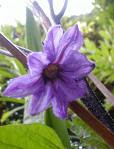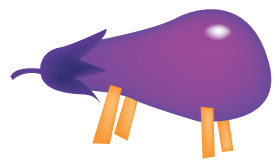. nasu 茄子と伝説 Legends about eggplants .
::::::::::::::::::::::::::::::::::::::::::::::::::::::::::::::::::::::::::::::::::::::::::::::::::::
Eggplant, aubergine (nasu)
***** Location: Japan
***** Season: see below
***** Category: Plant
tomato, see below
*****************************
Explanation
The Japanese name, nasu or nasubi probably derived from the word NATSU MI, meaning “summer flavor” 夏味
or “summer seed/fruit” 夏実 .
The eggplant thrives in the hot sun, maturing at the end of summer and through the fall.
© www.tasteofculture.com
:::::::::::::::::::::::::::::::::::::::::::::::::::::::::::::::::::::::::::::::::::::::::::::::::::
kigo for early summer
eggplant seedlings, nashi nae 茄子苗 (なすなえ)

:::::::::::::::::::::::::::::::::::::::::::::::::::::::::::::::::::::::::::::::::::::::::::::::::::
kigo for all summer
blossoms of the eggplant, nasu no hana 茄子の花 (なすのはな)
... hana nasu 花茄子(はななす)

:::::::::::::::::::::::::::::::::::::::::::::::::::::::::::::::::::::::::::::::::::::::::::::::::::


kigo for late summer
eggplant, nasu 茄子 (なす), nasubi なすび
first eggplant, hatsu nasu 初茄子(はつなす)

pickled eggplants, nasuzuke 茄子漬(なすづけ)
soup with eggplants (usually miso soup), nasujiru 茄子汁(なすじる)
. grilled eggplants, shigiyaki 鴫焼(しぎやき) .
..... shigi tsuboyaki 鴫壺焼
grilled eggplants filled with snipe meat
(a dish loved by the samurai of the Edo period)
fried or grilled eggplants, yakinasu 焼茄子(やきなす)
... especially for barbeques
egg-shaped or long eggplants, tsuruboso sennari 蔓細千成(つるぼそせんなり)
... orido nasu 折戸茄子(おりどなす)
"really black", shinkuro 真黒(しんくろ)
mountain eggplants, yamanasu 山茄子(やまなす)
"violet stem", heta murasaki 蔕紫(へたむらさき)
long eggplant, naga nasu 長茄子(ながなす)
round eggplant, maru nasu 丸茄子(まるなす)

pouch-shaped eggplant, kinchaku nasu 巾着茄子(きんちゃくなす)
white eggplant, shiro nasu 白茄子(しろなす)

:::::::::::::::::::::::::::::::::::::::::::::::::::::::::::::::::::::::::::::::::::::::::::::::::::
kigo for early autumn
horse made of eggplant, nasu no uma 茄子の馬 (なすのうま)
This is a special decoration for the ancestor's celebrations during the Bon festival. Children prepare little toy animals from vegetables to welcome the souls and see them off later.


pumpkin horse, uri no uma 瓜の馬(うりのうま)
pumpkin cow, uri no ushi 瓜の牛(うりのうし)
eggplant cow, nasu no ushi 茄子の牛(なすのうし)
"welcoming horse", mukae uma 迎馬(むかえうま)
"good bye-horse", okuri uma 送馬(おくりうま)
Decoration for the Bon Festival (o-bon) Japan.

:::::::::::::::::::::::::::::::::::::::::::::::::::::::::::::::::::::::::::::::::::::::::::::::::::
observance kigo for late autumn
mikunichi nasu みくにち茄子(みくにちなす)
"eggplants eaten on the three days"
the 9th, 19th and 29th of the ninth lunar month
see Chrysathemum Festival
:::::::::::::::::::::::::::::::::::::::::::::::::::::::::::::::::::::::::::::::::::::::::::::::::::
:::::::::::::::::::::::::::::::::::::::::::::::::::::::::::::::::::::::::::::::::::::::::::::::::::
"Never feed a bride autumnal eggplants..."
AKI NASU WA YOME NI KUWASU NA
"Parental advice is like eggplant... every flower yields fruit."
OYA NO IKEN TO NASUBI NO HANA WA SEN NI HITOTSU MO MUDA MO NAI.
Read some more eggplant recipies here:
© www.tasteofculture.com
:::::::::::::::::::::::::::::::::::::::::::::::::::::::::::::::::::::::::::::::::::::::::::::::::::::
Nasu, eggplant and augerbine dishes
WASHOKU ... Japanese Food SAIJIKI
*****************************
Worldwide use
*****************************
Things found on the way
Tokugawa Ieyasu was very fond of eggplants, went hawking and liked mount Fuji (see first dream, below).
The eggplant farmers of the town of Utsunomiya were allowed to bring an offering of eggplants from each farm, collected by their representatives and delivered to the Toshogu shrine in Nikko as an offering to the deified Ieyasu once a year.
nasumori 茄子守り preserving the eggplants
Orido nasu 折戸ナス are offered at the Toshogu Shrine in Kuno-San, Shizuoka.
. Nikko Toshogu Shrine 東照宮 徳川家康 .
:::::::::::::::::::::::::::::::::::::::::::::::::::::::::::::::::::::::::::::::::::::::::::::::::::::::

わっぱ入だるま茄子辛子漬 Daruma Nasu
Eggplant pickles in a barrel
from small eggplants, with lots of red pepper
*****************************
HAIKU
春雨や 二葉に萌ゆる 茄子種
harusame ya futaba ni moyuru nasubidane
spring rain -
two leaves sprout
from the eggplant seedling
Matsuo Basho
. Spring rain and rain in spring.
:::::::::::::::::::::::::::::::::::::::::::::::::::::::::::::::::::::::::::::::::::::::::::::::::::
めずらしや山を出羽の初なすび
mezurashi ya yama o Dewa no hatsu nasubi
how wonderful and extraordinary !
coming out of the sacred Dewa mountains
to these first eggplants
Tr. Gabi Greve
Matuo Basho at Sakata
Minden Nasu Eggplants
. Matsuo Basho 松尾芭蕉 - Archives of the WKD .
:::::::::::::::::::::::::::::::::::::::::::::::::::::::::::::::::::::::::::::::::::::::::::::::::::::
二三本茄子植ても小てふ哉
ni sambon nasubi uete mo ko chô kana
even when planting
two or three eggplants...
little butterflies
七夕に一本茄子立りけり
tanabata ni hito moto nasubi tateri keri
Tanabata Night--
a single eggplant
standing up
Perhaps Issa is suggesting that the eggplant, like humans on this night, is standing up, star-gazing.
あちこちに茄子も下る枯の哉
achi kochi ni nasubi mo sagaru kareno kana
here and there
eggplants dangle too...
withered fields
Issa
Tr. David Lanoue
.................................................................................
守り札かけて育つやはつ茄子
mamori fuda kakete sodatsu ya hatsu nasubi
growing strong
protected by a talisman -
first eggplants
Kobayashi Issa

This eggplant talisman from the temple Zoojooji 増上寺 Zojo-Ji in Edo grants three wishes
a grain of rice for plenty of food all year
a knotted hair pin for finding a good partner
a gold coin for good luck with money
I am not sure this was already sold at the time of Issa.
Here is another nasubi strap talisman, sold at the shrine
Hibita Jinja 比々多神社 in Kanagawa, Isehara town.
This is a pun with nasu ... may it become as you wish
願をなす

And a mamori bag with your own name imprinted for extra good
Don't give up, NASU luck. あきらめない

. Shrine Hibita Jinja 比々多神社 .
. Amulets and Talismans from Japan .
:::::::::::::::::::::::::::::::::::::::::::::::::::::::::::::::::::::::::::::::::::::::::::::::::::

source : rakanneko.jp/buson
水桶にうなずきあふや瓜茄子
mizuoke ni unazuki-au ya uri nasubi
in a water basin
they nodd to each other -
gourds and eggplants
Tr. Gabi Greve
The cut marker YA is at the end of line 2.
In the Edo period, wooden basins were used to cool vegetables under running water.
. WKD : Yosa Buson 与謝蕪村 in Edo .
There are many kinds of uri 瓜 -
makuwa uri 真桑瓜 Oriental melon, Cucumis melo
hisago 瓠 Hisago gourd, bottle gourd
. WKD : URI - melons and gourds .
Buson wrote this haiku during his travels in memory of "Oku no Hosomichi":
秋涼し手毎にむけや瓜茄子
. aki suzushi te goto ni muke ya uri nasubi .
Basho - - - - Station 35 - Kanazawa 金沢 - - -
:::::::::::::::::::::::::::::::::::::::::::::::::::::::::::::::::::::::::::::::::::::::::::::::::::
茄子の花 今日の飯に マヨネーズ
nasu no hana kyoo no meshi ni mayoneezu
eggplant flowers -
he heaps mayonaise
on his bowl of rice
Gabi Greve, 2004
*****************************
Related words
***** Datura, "crazy eggplant, kichigai nasu"
気違茄子(きちがいなす), ダチュラ
Trumpet flower
:::::::::::::::::::::::::::::::::::::::::::::::::::::::::::::::::::::::::::::::::::::::::::::::::::::

***** aka nasu 赤茄子(あかなす)tomato
lit. "red eggplant"
TOMATO トマト (とまと) !
kigo for late summer
Momotaro Tomatoes from Okayama 桃太郎トマト
sharing tomatoes
the resident woodchuck
is no hog
George Hawkins
Happy Haiku Forum, August 2010
.................................................................................
September downpour--
bad tomatoes float down
Soweto road
Caleb Mutua, Kenya
Kenya Saijiki Forum
:::::::::::::::::::::::::::::::::::::::::::::::::::::::::::::::::::::::::::::::::::::::::::::::::::::
***** . First Dream (hatsuyume 初夢) .
It is considered to be particularly good luck to dream of
Mount Fuji, a hawk, and an eggplant.
WASHOKU :
YASAI . Vegetable SAIJIKI
. nasu 茄子と伝説 Legends about eggplants .
[ . BACK to DARUMA MUSEUM TOP . ]
[ . BACK to WORLDKIGO . TOP . ]
:::::::::::::::::::::::::::::::::::::::::::::::::::::::::::::::::::::::::::::::::::::::::::::::::::::






5 comments:
May rain--
another tomatoless
stew
Hussein Haji, Kenya, 2010
武家町の畠になりぬ秋茄子
buke machi no hatake ni narinu aki nasubi
Ripening in fields
that once were the samurai quarter--
autumn eggplant
Masaoka Shiki
Tr. Burton Watson
茄子をもむ塩にむらさき暮れのこり
nasu o momu shio ni murasaki kurenokori
kneading eggplants…
purple on salt remains
like light after the sunset
Yabuki Nobuhiko 矢吹申彦
(Tr. Fay Aoyagi)
.
Yosa Buson
水桶にうなづきあふや瓜茄子
mizu-oke ni unazuki-au ya uri nasubi
in the water tub
they nodd to each other
a melon and an eggplant
for priest
渡辺雲裡坊 Watanabe Unribo Seihan (1692-1761)
.
Kobayashi Issa
芝門や貰ふたる日がはつ茄子
shiba no to ya morautaru hi ga hatsu nasubi
this rundown house --
our first eggplants of the year
are a gift
This hokku is from the summer of 1822, when Issa was living in his hometown and traveling around to see students nearby. Since Issa refers to his poor old house, he was presumably at home in his house when he wrote this hokku. It was common to use a humble word for one's own house, but Issa may also be referring to the fact that he lives in a old farmhouse that would be considered a bit rundown by city people in Edo.
Most farmers grew their own eggplants, but Issa seems to be lamenting the fact that this year the first eggplants, which were considered especially fresh and delicious, were a gift he and his wife received, not something they grew. It's not clear whether they are a gift from a neighbor or a student, but if they are from a neighbor, it would be normal to reply soon afterwards by giving the giver a similar gift, but Issa seems to have nothing to give and regrets being empty-handed.
Another Issa hokku from this period speaks of leaving the first eggplants on their stems, perhaps to mature a little more, and then discovering they'd been stolen, so that may be the reason his and his wife's first eggplants of the year were a gift from someone.
Chris Drake
.
Post a Comment